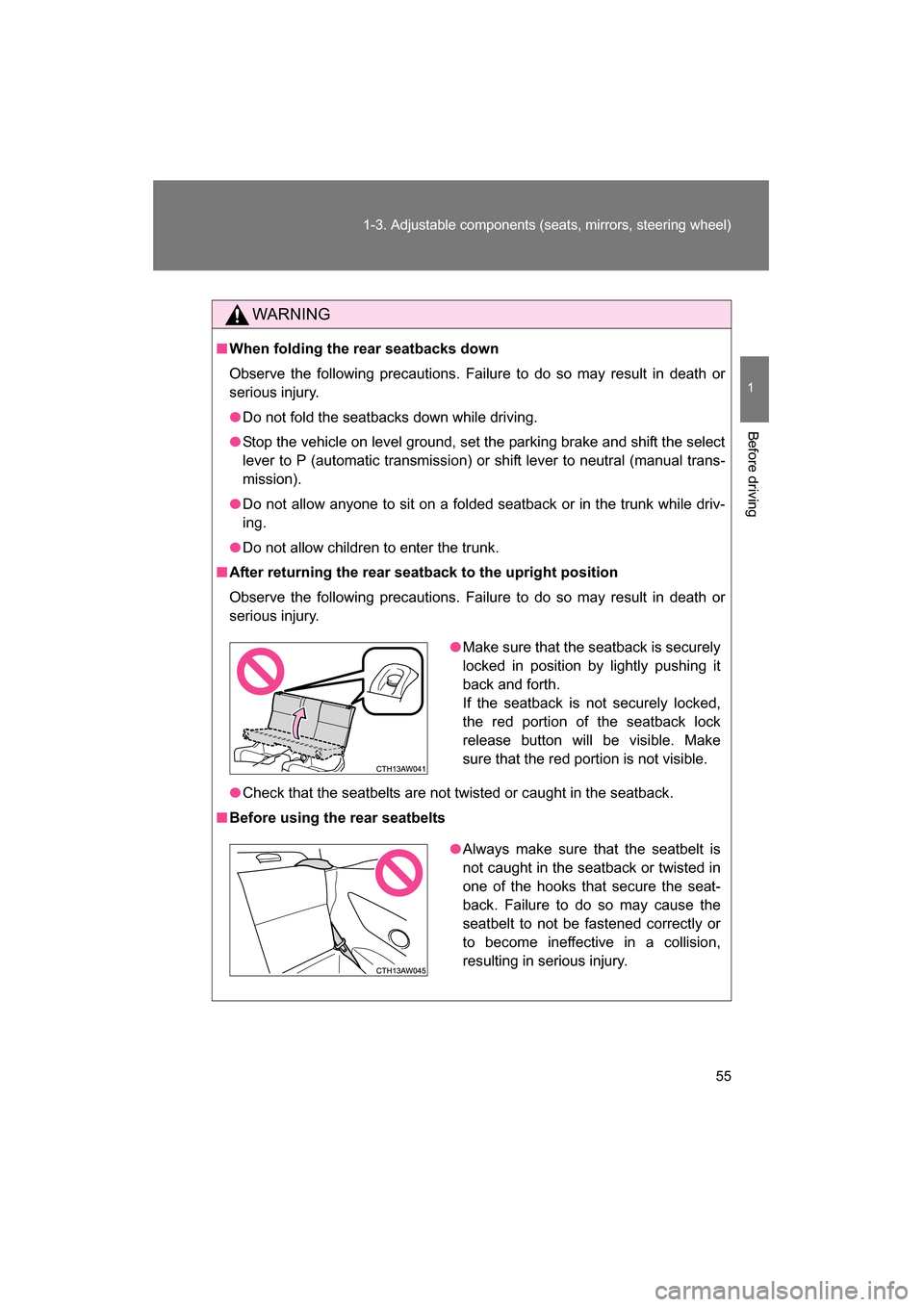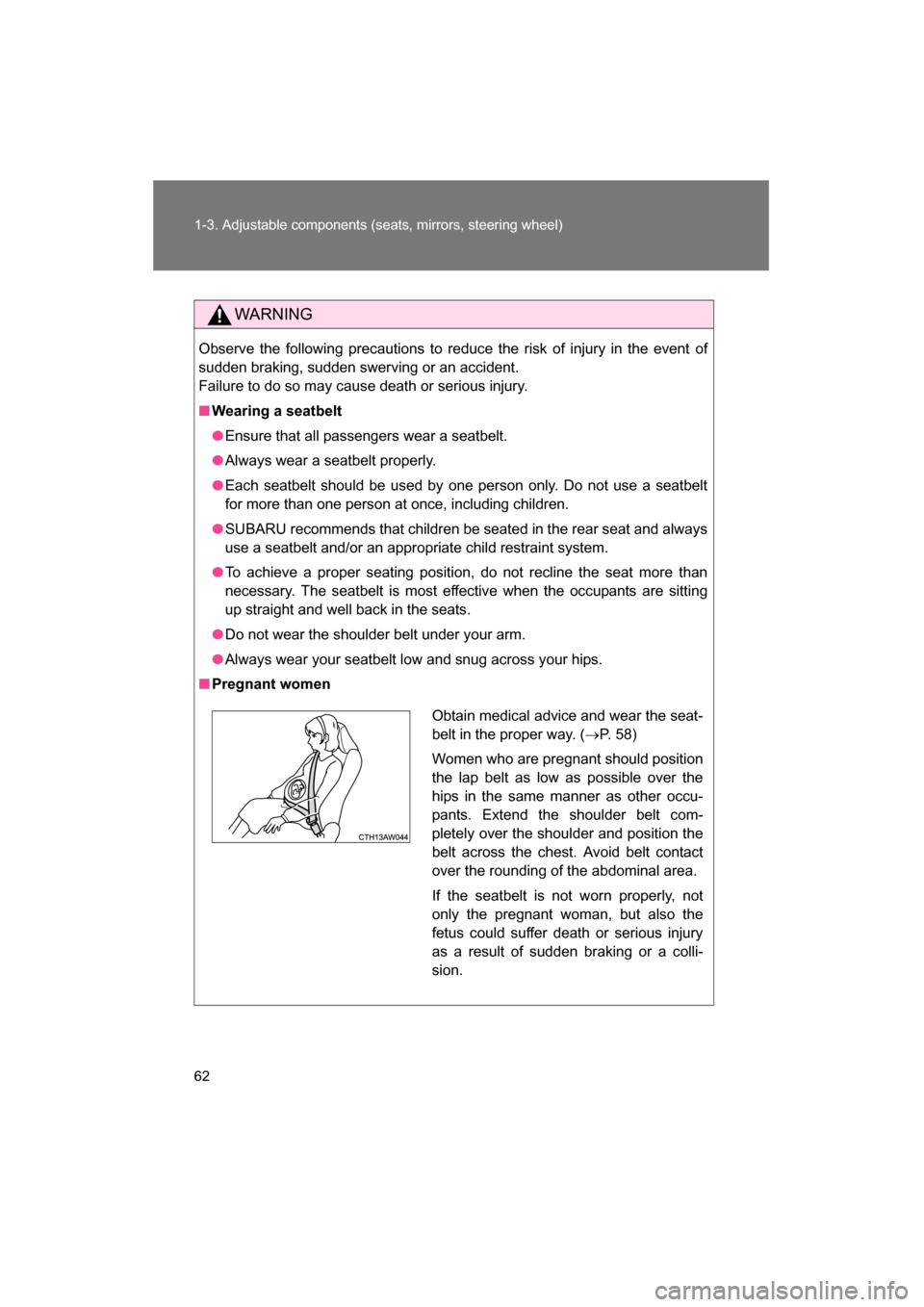Page 55 of 492

55
1-3. Adjustable components (seats, mirrors, steering wheel)
1
Before driving
WARNING
■When folding the rear seatbacks down
Observe the following precautions. Failure to do so may result in death or
serious injury.
●Do not fold the seatbacks down while driving.
●Stop the vehicle on level ground, set the parking brake and shift the select
lever to P (automatic transmission) or shift lever to neutral (manual trans-
mission).
●Do not allow anyone to sit on a folded seatback or in the trunk while driv- ing.
●Do not allow children to enter the trunk.
■After returning the rear seatback to the upright position
Observe the following precautions. Failure to do so may result in death or
serious injury.
●Check that the seatbelts are not twisted or caught in the seatback.
■Before using the rear seatbelts
●Make sure that the seatback is securely
locked in position by lightly pushing it
back and forth.
If the seatback is not securely locked,
the red portion of the seatback lock
release button will be visible. Make
sure that the red portion is not visible.
●Always make sure that the seatbelt is
not caught in the seatback or twisted in
one of the hooks that secure the seat-
back. Failure to do so may cause the
seatbelt to not be fastened correctly or
to become ineffective in a collision,
resulting in serious injury.
Page 56 of 492
56
1-3. Adjustable components (seats, mirrors, steering wheel)
Head restraints
■Removing the head restraints
■Installing the head restraints
Head restraints are provided for front seats.
Up
Pull the head restraints up.
Down
Push the head restraint down
while pushing the lock releasebutton.
Lock release button
Pull the head restraint up while pressing
the lock release button.
Align the head restraint with the installa-
tion holes and push it down to the lock
position.
Press and hold the lock release button
when lowering the head restraint.
Page 57 of 492
57
1-3. Adjustable components (seats, mirrors, steering wheel)
1
Before driving
■Adjusting the height of the head restraints
WARNING
■Head restraint precautions
Observe the following precautions regarding the head restraints. Failure to
do so may result in death or serious injury.
●Use the head restraints designed for each respective seat.
●Adjust the head restraints to the correct position at all times.
●After adjusting the head restraints, push down on them and make sure
they are locked in position.
●Do not drive with the head restraints removed.
Make sure that the head restraints are
adjusted so that the center of the head
restraint is closest to the top of your ears.
Page 58 of 492
58
1-3. Adjustable components (seats, mirrors, steering wheel)
Seatbelts
Make sure that all occupants are wearing their seatbelts before driv-
ing the vehicle.
■Correct use of the seatbelts●Extend the shoulder belt so
that it comes fully over the
shoulder, but does not
come into contact with the
neck or slide off the shoul-
der.
● Position the lap belt as low
as possible over the hips.
● Adjust the position of the
seatback. Sit up straight
and well back in the seat.
● Do not twist the seatbelt.
■Fastening and releasing the seatbelt
Fasten the seatbelt
Push the plate into the buckle
until a click sound is heard.
Release the seatbelt
Press the release button.
As the seatbelt is retracted
automatically, make sure that it
is not tangled or twisted.
Release button
Page 59 of 492
59
1-3. Adjustable components (seats, mirrors, steering wheel)
1
Before driving
Front seatbelt guideTo enable the seatbelt to be eas-
ily extended, pass the seatbelt
through the guide.When getting in or out of the rear
seats, release the seatbelt from
the guide.
Seatbelt pretensioners (front seats)
The pretensioner helps the seat-
belt to quickly restrain the occu-
pant by retracting the seatbelt
when the vehicle is subjected to
certain types of severe frontal
collision and/or side collision.The pretensioner may not acti-
vate in the event of a minor frontal
impact, a side impact or a rear
impact.
Page 60 of 492

60
1-3. Adjustable components (seats, mirrors, steering wheel)
■Emergency locking retractor (ELR)
The retractor will lock the belt during a sudden stop or on impact. It may also
lock if you lean forward too quickly. A slow, easy motion will allow the belt to
extend so that you can move around fully.
■Automatic locking retractor (ALR)
When a passenger's shoulder belt is completely extended and then
retracted even slightly, the belt is locked in that position and cannot be
extended. This feature is used to hold the child restraint system (CRS) firmly.
To free the belt again, fully retract the belt and then pull the belt out once
more. (→P. 137)
■Child seatbelt usage
The seatbelts of your vehicle are principally designed for persons of adult
size.
●Use a child restraint system appropriate for the child, until the child
becomes large enough to properly wear the vehicle's seatbelt. (→ P. 133)
●When the child becomes large enough to properly wear the vehicle's
seatbelt, follow the instructions on P. 58 regarding seatbelt usage.
■Seatbelt pretensioners
●Seatbelt pretensioners are not designed to activate in minor frontal or
side impact, in rear impacts or in roll-over accidents.
●The following four components operate simultaneously when the vehicle
is subjected to a severe frontal collision.
Page 61 of 492
61
1-3. Adjustable components (seats, mirrors, steering wheel)
1
Before driving
●The following two components operate simultaneously when the vehicle
is subjected to a severe collision on the front passenger’s seat side of the
vehicle.
Page 62 of 492

62
1-3. Adjustable components (seats, mirrors, steering wheel)
WARNING
Observe the following precautions to reduce the risk of injury in the event of
sudden braking, sudden swerving or an accident.
Failure to do so may cause death or serious injury.
■Wearing a seatbelt
●Ensure that all passengers wear a seatbelt.
●Always wear a seatbelt properly.
●Each seatbelt should be used by one person only. Do not use a seatbelt
for more than one person at once, including children.
●SUBARU recommends that children be seated in the rear seat and always
use a seatbelt and/or an appropriate child restraint system.
●To achieve a proper seating position, do not recline the seat more than
necessary. The seatbelt is most effective when the occupants are sitting
up straight and well back in the seats.
●Do not wear the shoul der belt under your arm.
●Always wear your seatbelt low and snug across your hips.
■Pregnant women
Obtain medical advice and wear the seat-
belt in the proper way. ( →P. 58)
Women who are pregnant should position
the lap belt as low as possible over the
hips in the same manner as other occu-
pants. Extend the shoulder belt com-
pletely over the shoulder and position the
belt across the chest. Avoid belt contact
over the rounding of the abdominal area.
If the seatbelt is not worn properly, not
only the pregnant woman, but also the
fetus could suffer death or serious injury
as a result of sudden braking or a colli-
sion.